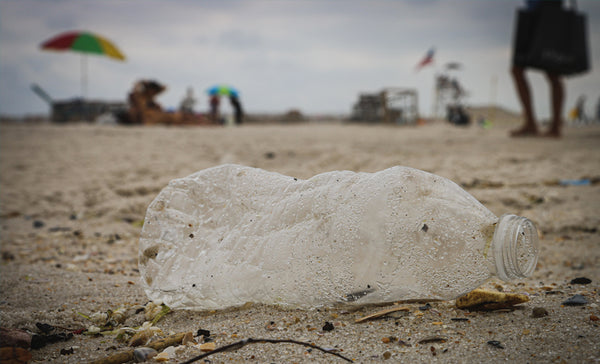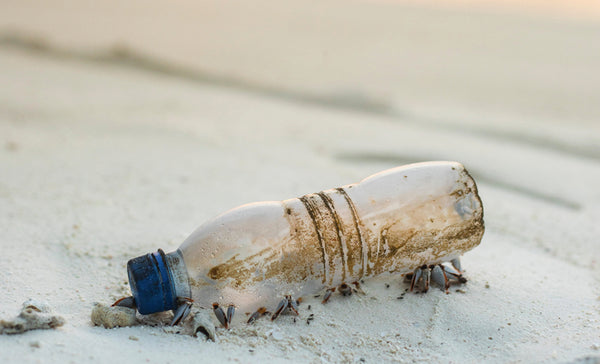You and I have one thing in common: we’ve both drank water from a disposable plastic water bottle at one point in our life. It's inevitable, you get thirsty throughout the day. And since none of us drink water from the tap, the only option is a bottle of water.
And as soon as you’re done with it, you toss it.
Soon after you’ve savored the last sip that bottle finds its home in either the trash or a recycling bin. We've kept the recycling fairy busy, but even her magic has its limits.
Have you ever stopped to think, "What happens to all those plastic water bottles?" If you ever take a look around and consider how many people are drinking from a plastic water bottle, it makes you wonder.
Bottled water affects your health, your environment, and your pocketbook. If you think we spend a lot of money on coffee, consider this: collectively, we spent $18.5 billion dollars on bottled water in 2017 according to the Beverage Marketing Corporation.
Let's take a look at the negative impact of plastic water bottles and the positive impact of reusable steel water bottles.
Negative impact of plastic water bottles
Negative health effects of plastic water bottles
So maybe you’re unconcerned about the environment, but it's not just the earth feeling the effects of all these plastic bottles. Research has shown that drinking from plastic water bottles can affect your health as well.
And that’s unfortunate because we typically drink bottled water for two reasons: convenience and because it’s supposed to be “cleaner.” Right?
Testing of bottled water has revealed many chemicals leading to abnormal hormone function and an increased risk of cancer, among other ills.
Most bottles used are made from polyethylene terephthalate (PET). Take a look at the bottom of your bottle. PET is labeled with a #1 recycling code. Historically, PET was considered to be a safe material when used to create single-use containers. However, new research shows that PET may leach antimony trioxide, a catalyst and flame retardant in PET. Trioxide can lead to respiratory and skin irritation and even miscarriage.
Phthalate endocrine disruptors also leach from PET. Antimony, considered to be a carcinogen, has also been found in bottled water. These chemical levels only increase with time. With time and heat, chemical levels can increase from 19 to 90 percent.
A few identified chemicals are one thing, but in 2013, German researchers identified 25,000 different chemicals in bottled water.

Negative environmental impact of plastic water bottles
As a global economy, we now purchase one million bottles a minute. Even though considered highly recyclable, polyethylene terephthalate (PET), takes 400 years to naturally decompose.
According to research, it’s estimated the ocean will contain more plastic by weight than fish by 2050. The plastic that finds its way into the oceans inevitably will pose a risk of ingestion by seabirds, fish, marine mammals, etc. It's not uncommon for sea life to have significant amounts of plastic in their stomach.
In fact, people who eat seafood ingest up to 11,000 tiny pieces of plastic every year. The amount of plastic found in oceans not only causes concern for the health of the fish but also to those who consume it. The European Food Safety Authority has asked that this issue is researched, citing increasing concern for human health and food safety “given the potential for microplastic pollution in edible tissues of commercial fish”.
You don’t have to be an environmental activist to see the problem with this picture. We now produce 20,000 bottles every second and that number is increasing. Thanks to recycling, there is an alternative to landfills. But unfortunately, only 7% of plastic water bottles are turned into new water bottles.
Negative financial impact of plastic water bottles
As previously mentioned, according to the Beverage Marketing Corporation, the U.S. spent $18.5 billion on bottled water in 2017. Bottled water (by volume) grew by 7 percent from 2016 to 2017 from 12.8 billion gallons to 13.7 billion gallons.
Bottled water has now surpassed soda as Americans' favorite drink. On the surface, you might say these numbers are a good thing: the sign of a more health-conscious society.
The $18.5 billion we spent on bottled water as a nation is hard to wrap your mind around. So let's take a look at how much a single person might spend on water in a given year.
In 2015, conservative estimates said the average American spent $100 on bottled water each year. But that was the average. And we have continued to increase our consumption of bottled water since then.
That doesn't take into consideration households with more than one person. Many people spend several hundred to even thousands of dollars per year just on bottled water.
And sure, drinking water rather than soda is a healthier choice. Unfortunately, the $18.5 billion was spent on single-use bottles of water. As we've already discovered, this isn't great for our health or the environment.
Positive impact of steel water bottles

Positive health impact of steel water bottles
The solution to plastic water bottles is a steel water bottle. Their impact on the environment is much less and they don’t carry the dangerous health effects.
But you should note that not all steel water bottles are created equal. Toxic levels of lead have been found in well-known steel water bottle brands. Before you buy a reusable water bottle, you should ensure that it’s made with 18/8 food-grade stainless steel.
I often hear people mistakenly assume their bottle is safe because it’s “metal.” But just because the bottle is metal, does not make it stainless steel.
Many of the well-known water bottle companies use aluminum, which has been linked to Alzheimer's and other diseases. Food grade products made with aluminum also require a plastic lining, which can contain BPA and other harmful chemicals.
With the research about the negative health impact of BPA, BPA-free products have been all the rage for a while. But many disposable plastic water bottles still use plastic containing BPA. BPA is a chemical that is known to cause severe health risks even in small quantities.
Your steel water bottle also comes with another health benefit: it can easily be cleaned. Have you ever had a water bottle that maintains a terrible smell even after you wash it? That’s because it’s difficult to completely clean a plastic water bottle due to the porous nature of plastic.
Thankfully the odor from bacteria often left behind in a plastic bottle can easily be cleaned from a steel bottle.

Positive environmental impact of steel water bottles
Americans consume 1,500 bottles every second. That adds up to 90,000 every hour and nearly 2.2 million each day.
Last year we used 167 disposable water bottles per person in America each year. Less than 23% of those bottles were recycled. But one steel water bottle can go a long way in reducing (and one day eliminating) this consumption.
One steel water bottle can last over 12 years. But you might be asking, “What about recycling? Can steel bottles be recycled?” And the answer is a resounding, “Yes!” Steel products can be recycled.
However, most curbside recycling programs will not accept your steel bottle. Most recycling programs crush and bale material for easy transport, and stainless-steel bottles are generally uncrushable.
If you reach the point and think your bottle has lived out its days, contact your local solid waste authority if curbside collection is not an option, identify the location of the nearest steel recycling facility.
Positive financial impact of steel water bottles

Let's say you buy one bottle of water each day. At $1.25 per bottle (this doesn't include the days you're especially thirsty and buy one or two more) that comes out to $456.25 (without tax) – and that's assuming you're not buying the expensive kind.
But instead, you decide to buy a $29.95 reusable steel water bottle. Spread out over that same year it costs you just $.08 per day.
But let's say you're just an average consumer of bottled water. Buying one reusable steel water bottle and refilling it each day will still save you a lot of money. Plus, it will provides more money for your other favorite beverage budget: coffee!
Conclusion
Choosing to buy a reusable steel water bottle will benefit your health, your environment, and your wallet. So, do yourself and your world a favor and grab a steel water bottle today!









